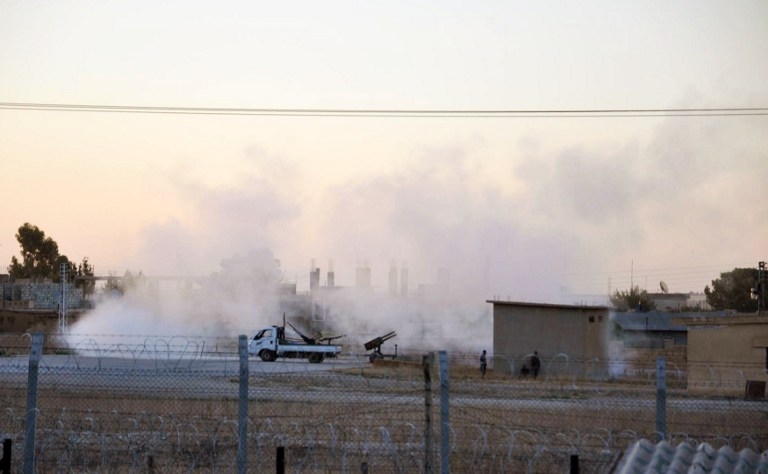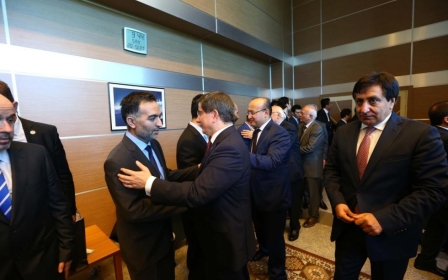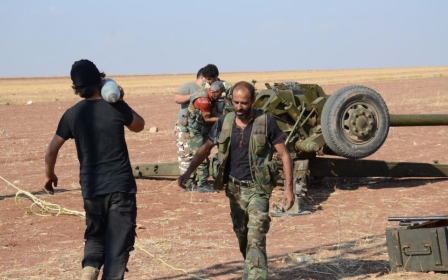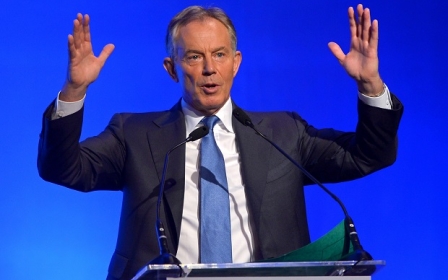Analysis: Combat against IS could be Turkey's double-edged sword

ISTANBUL - Over the weekend, Turkey celebrated the release of 49 hostages long-held by the Islamic State. The diplomatic achievement was widely applauded, but with border clashes ongoing and IS continuing to make gains, discourse is once again focusing on how Turkey should engage in Syria and whether it has more to gain, or more to lose, by stepping into the ring against the militants.
For a long time, Turkey could not rescue or take any other bold actions for the release of its hostages. When a US-led coalition was formed to counter the IS threat in Jeddah, Turkey refused to sign the communiqué, perhaps fearing, some hinted, that it could put its abducted citizens in harm's way.
Since the diplomatic personnel were released on Saturday, however, most of the arguments regarding Turkey's reluctance to joining the anti-IS coalition are now being reconsidered.
President Recep Tayyip Erdogan said on Sunday that Turkey could develop a more flexible approach against IS. On his way to New York to attend the UN General Assembly meeting, he told reporters, "We’ll make a decision after having extensive discussions with the coalition forces about the next road map."
Yet, despite signs that Turkey's stance has begun to alter, a full-fledged and unconditional contribution to the coalition - especially a joint military action - is still highly unlikely. According to Alaeddin Yalcinkaya at Marmara University, Turkey's approach to the IS problem was about much more than the hostage situation.
"Let us assume that IS had not abducted Turks: even this situation would not lead Turkey to engage in a military intervention," Yalcinkaya told MEE. "Bombing from air and putting boots on the ground are different things; and Turkey cannot afford to be sucked into a never-ending conflict by any means."
It has been hinted that the Turkish government has been taken hostage by the IS, with very limited options to develop an efficient way to completely remove the IS threat, but the situation is much more complex than that.
Turkey paradigm
A former friend of the Syrian Ba'ath government, Turkey was quickly at odds with President Bashar al-Assad when the latter decided to violently crush his country's opposition. Since then, Turkey has been one of the most outspoken adversaries of the Assad government, working for its total removal.
One of Turkey's first initiatives to this end was to give broad support to the Free Syrian Army (FSA) fighters, a loose organisation of groups fighting to topple the Syrian government. Turkey's countless calls to the international community to arm the rebels and numerous rejections of this attempt in the UN Security Council eventually paved the way for other armed groups to mushroom in the battlefield.
The rise of the of al-Nusra Front - an offshoot of al-Qaeda - by 2012 made things much more complicated for Turkey. Championing Syria's fragmented opposition, Turkey found itself in a dilemma between supporting an organisation that is listed as a "terrorist group" by the United States since December 2012 and adopting the mantra of "the enemy of my enemy is my friend."
It was not until June 2013 that Turkey followed in the US’s footsteps and outlawed the group, although elements within the government were alleged to be have continued supporting the group.
Similar comments were made by Salih Muslim, the leader of the Democratic Union Party (PYD) - the Syrian branch of Kurdish armed fighters linked to the PKK. When unconfirmed leaks revealed Turkish officials' support for the group, the government strongly condemned these allegations and stated that it does not support "terrorists."
When IS extended its operational area and successfully captured Mosul this summer, and the international community finally stood up and decided to counter the threat that was already wreaking havoc in most of the Levant, Turkey found itself in an odd position.
Not only had IS seized dozens of its nationals, but Turkey also found itself constrained by an array of other insurmountable factors that have blossomed during the last three year and a half years of conflict and restricted its options.
As some international media outlets recently revealed, "jihadists" flocking from Western countries have transited through Turkey to join the war in Syria and Iraq and used the country as a convenient recruiting ground. There are now IS supporters - or at the very least sympathisers - in Turkey who the country must consider carefully when mulling over any action against IS, especially with military measures.
Sinan Ulgen, a former Turkish diplomat and the President of Istanbul based think-tank EDAM, does not believe that Turkey remained pacified against the IS threat because of the hostage situation.
"On one hand," said Ulgen, Turkey acknowledges potential terrorist attacks that IS could conduct in the country while, on the other hand, it does its own part to help the anti-IS coalition."
In order to do so, Turkey has boosted border security, engaged in more cooperation with the foreign intelligence services, extended the blacklist to prevent foreign fighters to enter the country, and taken significant steps to halt petroleum smuggling.
"In other words, Turkey was not pacified because of the hostage situation, but more than that, IS's organisation in Turkey and the latent threat of terrorist attacks makes it difficult for Turkey to adopt drastic measures," he told MEE.
Last week, Turkey announced that it would not allow the US-led forces to use its territory, nor the Incirlik Airbase except for logistical and humanitarian operations. However, it is too early to speculate how Turkey would reverse this decision as the hostage situation is now resolved.
Kurds as saviours?
One of the developments that the Turkish government is secretly worried about is ground troops fighting against the IS. As of now, the FSA is incapable of countering the IS, let alone Assad's forces; and other bordering countries have limited options to put their troops on the battlefield.
Therefore, the only viable options are to rely on the Kurdish Peshmerga, the armed forces of the Iraqi Kurdistan or supporting battle-hardened Kurdish fighters in Iraq and Syria who have been combatting in the region for the last 30 years. This is something that Turkey absolutely cannot accept for several reasons.
"On one hand," said Ulgen, "Turkey does not want the anti-IS coalition to provide weapons to the Peshmerga because they could eventually fall into the hands of PKK-PYD fighters. This has been repeatedly stressed by the Turkish foreign minister Mevlut Cavusoglu. Also, Erdogan told US President Barack Obama that the proposed weapons aid could undermine Turkey's settlement process with the Kurds.
On the other hand, relying on PKK-PYD fighters could stipulate a call for international legitimacy for the two groups. While the first is on the terrorist list by the US, the EU and Turkey, the latter is not. Amberin Zaman at Al-Monitor recently wrote that "Western officials, meanwhile, predict that it is only a matter of time before their governments initiate formal ties if not with the PKK then certainly with the PYD."
These two scenarios increase the delicacy of the situation: Turkey wants to counter the IS threat as fast and as much as can, but relying on the Kurdish fighters could endanger the peace talks initiated by the government two years ago. It is expected that the Turkish government will advance the process this fall, but any external factor might disturb the fragile balance and prematurely end the negotiations.
Sinan Ulgen, the former Turkish diplomat, thinks that the overlap of the IS threat and peace talks is unfortunate. "If PKK officially fights against the IS, this would result in gaining international legitimacy, thus empowering the group during the negotiations," he argued. "They would boost their demands; and if the negotiations collapse, this would outmanoeuvre Turkey."
Moreover, an early conclusion defining the ground fighting method against the IS could be dangerous. Bombing targets from high above does not necessarily produce the desired results as has been proven in many instances over the last two decades, and ground warfare is tricky for all the countries involved, especially for bordering Turkey and Iran.
Alaeddin Yalcinkaya at Marmara University believes that the Kurdish option is being presented as the only plausible one. "Yet, we still do not know what the IS is about, and the international community is under the illusion that the only way to deal with the problem is to arm the Kurds," he said.
He added that IS captured the weapons that the US provided to the Iraqi government, and the same scenario could happen when Kurds acquire American weapons as well. "To deal with the situation effectively, Turkey should not pick any sides and do what it did during the Iran-Iraq war: neutrality."
No matter what the international community or Turkey do - either arming the Kurds or a coalition-led ground war - both seem to be a double-edged sword for Turkey.
New MEE newsletter: Jerusalem Dispatch
Sign up to get the latest insights and analysis on Israel-Palestine, alongside Turkey Unpacked and other MEE newsletters
Middle East Eye delivers independent and unrivalled coverage and analysis of the Middle East, North Africa and beyond. To learn more about republishing this content and the associated fees, please fill out this form. More about MEE can be found here.




